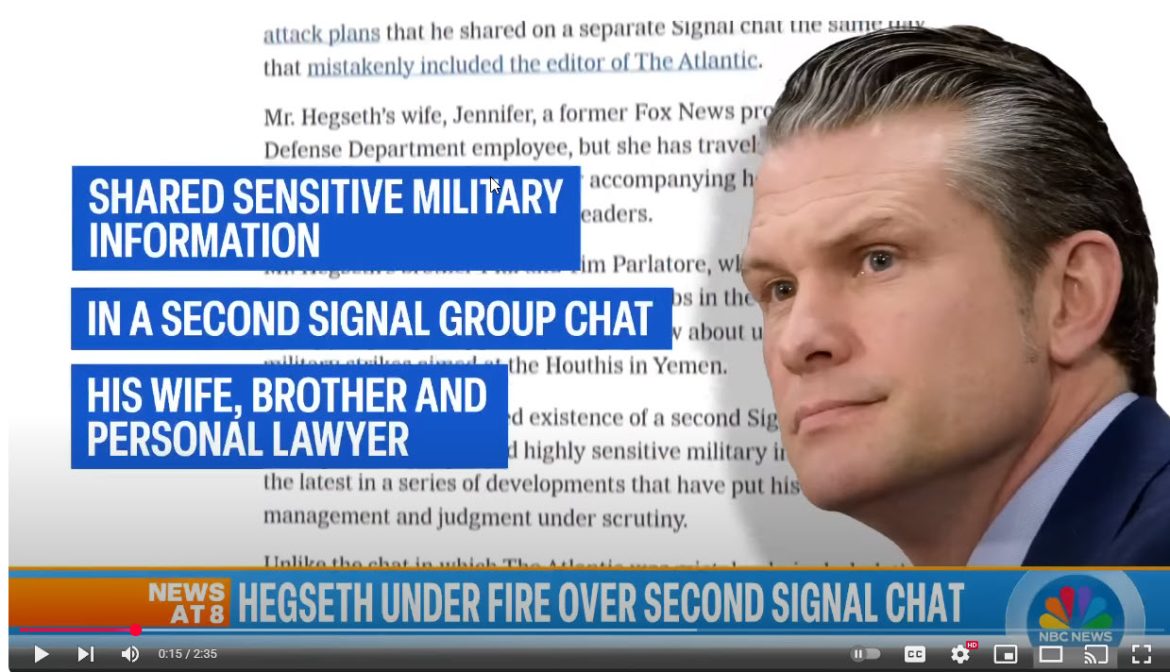Secretary of Defense Pete Hegseth is facing renewed scrutiny over national security protocols after reports reveal he shared detailed military plans in a second Signal app group chat, this time with members of his own family. The revelation follows a previous controversy last month involving the unauthorized sharing of sensitive military information via encrypted messaging platforms among Trump administration officials.
According to multiple reports, the second chat includes Hegseth’s brother and personal lawyer—both of whom currently hold positions within the Department of Defense—as well as his wife, who holds no government role. The chat reportedly contained detailed information about a classified U.S. military operation targeting Houthi forces in Yemen, a mission already under intense scrutiny due to its implications for U.S. foreign policy and regional stability.
Hegseth has not denied the report outright. Speaking briefly outside the White House, the Secretary frames the story as part of a political smear campaign, claiming, “some leakers got dismissed” from the Pentagon, and that “hit pieces” are now surfacing in retaliation. While Hegseth avoids a direct refutation, his remarks suggest an effort to redirect the narrative toward internal power struggles within the Department of Defense.
The White House, meanwhile, remains firm in its stance. Deputy Press Secretary Anna Kelly states that no classified material was shared, dismissing the media reports as exaggerated. “No matter how many times the legacy media tries to resurrect the same non-story, they can’t change the fact that no classified information was shared,” she says.
This latest incident compounds an already volatile situation stemming from last month, when a Signal group chat involving top Trump cabinet members—Hegseth included—mistakenly included a journalist. That thread also contained discussions of operational strategies for the U.S. military response in Yemen, raising questions about communication security and protocol breaches at the highest levels of the defense establishment.
Sources close to the Pentagon say the internal environment is tense, as several staffers reportedly dismissed for leaking information are now being informally linked to the escalating media coverage. Critics argue that Hegseth’s casual use of Signal to discuss sensitive military operations with family members crosses ethical and potentially legal boundaries, especially as the chats involve individuals outside the classified clearance system.
Legal analysts note that even if classified details were not explicitly shared, the act of distributing any operational information related to national defense could violate established security regulations. The inclusion of Hegseth’s wife, a private citizen, has intensified concerns about whether familial relationships are being prioritized over secure communication standards.
The House Armed Services Committee is reportedly monitoring the situation. While no formal inquiry has been launched, several members are said to be discussing the need for hearings on the matter, particularly in light of the Trump administration’s broader approach to intelligence-sharing practices.
Meanwhile, U.S. military operations in Yemen continue, with Defense Department sources indicating that preparations remain ongoing despite the communications controversy. The operation, targeting Houthi infrastructure in retaliation for attacks on commercial vessels in the Red Sea, has become emblematic of the geopolitical balancing act the U.S. faces in the Middle East.
With growing bipartisan concerns over data security, transparency, and accountability in military leadership, Hegseth’s actions may have long-lasting implications—not only for his tenure as Secretary of Defense, but also for national policy on how sensitive military data is handled in an era of encrypted communication apps and digital leaks.



